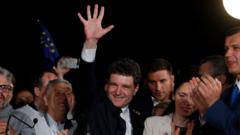The viability of Radio Free Europe is in jeopardy as it receives limited emergency funds from the E.U. while awaiting critical support from the U.S.
E.U. Steps In with Emergency Funds for Radio Free Europe Amid U.S. Funding Freeze

E.U. Steps In with Emergency Funds for Radio Free Europe Amid U.S. Funding Freeze
The European Union provides short-term support for Radio Free Europe following cuts from the Trump administration, but it's not enough for long-term viability.
In a significant move, the European Union announced on Tuesday that it would offer emergency financial assistance to Radio Free Europe, a media outlet known for delivering independent journalism in regions with restricted press freedom. The aid comes in light of funding cuts mandated by the Trump administration, which has frozen federal support crucial to the outlet's operations.
Kaja Kallas, the European Union’s leading diplomat, revealed that the EU would provide 5.5 million euros (approximately $6.2 million) to sustain Radio Free Europe. While acknowledging the urgency of supporting independent reporting amid the global influx of unchecked media content, she expressed regret that the emergency funds would only cover a limited timeframe and would not fully address Radio Free Europe’s financial needs.
Since President Trump took office, he has initiated steps to dismantle the U.S. Agency for Global Media, the parent organization of Radio Free Europe, which, until the recent funding freeze, received $12 million a month from Congress. Despite a previous ruling from a U.S. District Court that temporarily halted the termination of these funds, a subsequent decision by a federal appeals court permitted the administration to continue withholding them.
Stephen Capus, the president of Radio Free Europe/Radio Liberty, conveyed gratitude for the EU's emergency funding, which he described as essential for "a short while longer." He indicated that the organization is actively pursuing legal channels to reclaim the withheld congressional funds.
The news agency filed an emergency petition in U.S. District Court for the funds needed for May. Radio Free Europe mentioned that it had received the previous month's funding later than expected, forcing operational cutbacks, including staff reductions and programming limitations.
Historically, Radio Free Europe, which began broadcasting during the Cold War, has been reliant on U.S. funding to report on critical issues like human rights violations and corruption in countries led by authoritarian regimes. Today, its broadcasts cover 23 nations, including Russia, Ukraine, and Iran, as well as areas in Central Asia and the Caucasus.






















